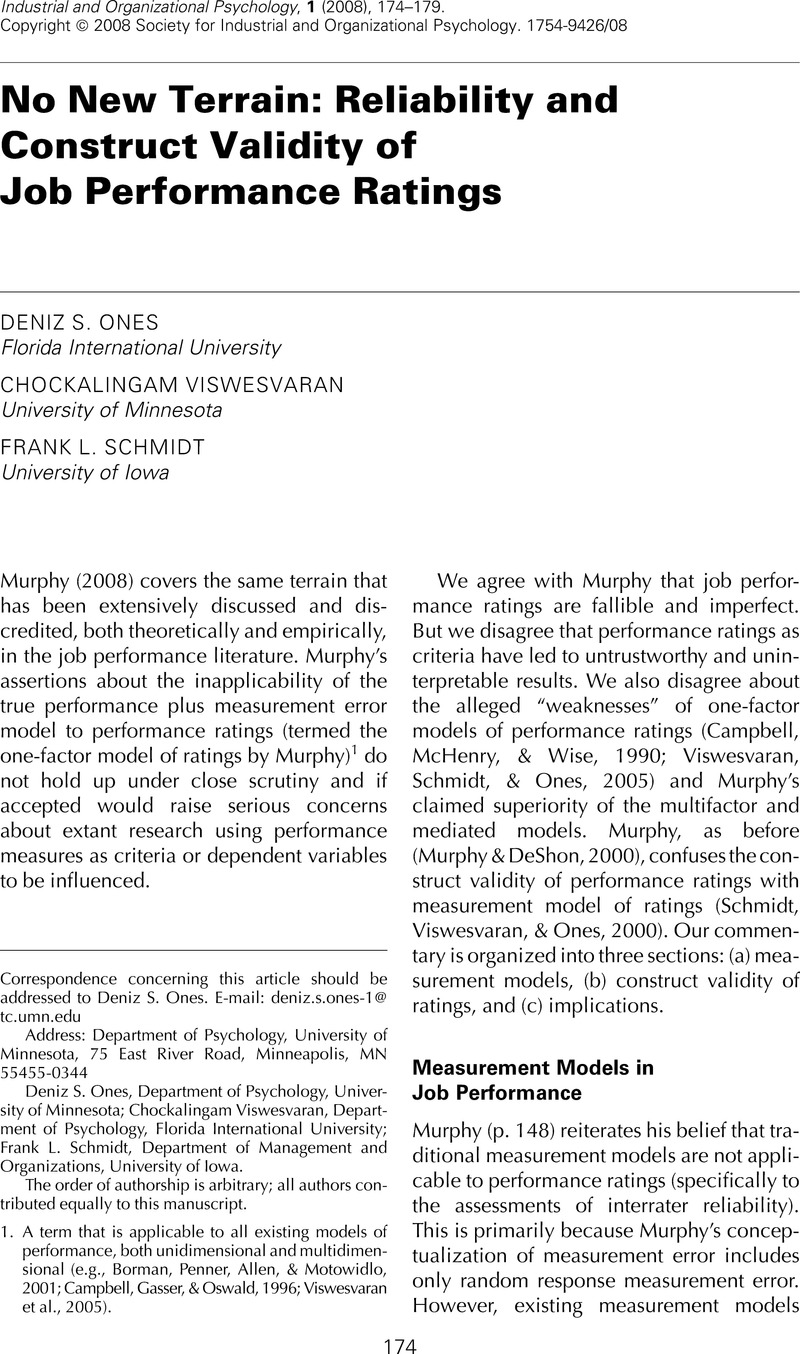Crossref Citations
This article has been cited by the following publications. This list is generated based on data provided by Crossref.
Murphy, Kevin R.
2008.
Perspectives on the Relationship Between Job Performance and Ratings of Job Performance.
Industrial and Organizational Psychology,
Vol. 1,
Issue. 2,
p.
197.
Kuncel, Nathan R.
Ones, Deniz S.
and
Sackett, Paul R.
2010.
Individual differences as predictors of work, educational, and broad life outcomes.
Personality and Individual Differences,
Vol. 49,
Issue. 4,
p.
331.
Hoffman, Brian J.
and
Dilchert, Stephan
2012.
The Oxford Handbook of Personnel Assessment and Selection.
p.
543.
Bono, Joyce E.
Hooper, Amy C.
and
Yoon, David J.
2012.
Impact of rater personality on transformational and transactional leadership ratings.
The Leadership Quarterly,
Vol. 23,
Issue. 1,
p.
132.
Viswesvaran, Chockalingam
Ones, Deniz S.
Schmidt, Frank L.
Le, Huy
and
Oh, In-Sue
2014.
Measurement Error Obfuscates Scientific Knowledge: Path to Cumulative Knowledge Requires Corrections for Unreliability and Psychometric Meta-Analyses.
Industrial and Organizational Psychology,
Vol. 7,
Issue. 4,
p.
507.
Albrecht, Anne-Grit
Dilchert, Stephan
Deller, Jürgen
and
Paulus, Frieder M.
2014.
Openness in Cross-Cultural Work Settings: A Multicountry Study of Expatriates.
Journal of Personality Assessment,
Vol. 96,
Issue. 1,
p.
64.
Viswesvaran, Chockalingam
Ones, Deniz S.
Schmidt, Frank L.
Le, Huy
and
Oh, In-Sue
2014.
Measurement Error Obfuscates Scientific Knowledge: Path to Cumulative Knowledge Requires Corrections for Unreliability and Psychometric Meta-Analyses.
Industrial and Organizational Psychology,
Vol. 7,
Issue. 4,
p.
507.
Goštautaitė, Bernadeta
and
Bučiūnienė, Ilona
2015.
The role of work characteristics in enhancing older employees' performance: evidence from a post-Soviet country.
The International Journal of Human Resource Management,
Vol. 26,
Issue. 6,
p.
757.
Thompson, Geir
and
Glasø, Lars
2015.
Situational leadership theory: a test from three perspectives.
Leadership & Organization Development Journal,
Vol. 36,
Issue. 5,
p.
527.
Campbell, John P.
and
Wiernik, Brenton M.
2015.
The Modeling and Assessment of Work Performance.
Annual Review of Organizational Psychology and Organizational Behavior,
Vol. 2,
Issue. 1,
p.
47.
Gorman, C. Allen
Cunningham, Christopher J. L.
Bergman, Shawn M.
and
Meriac, John P.
2016.
Time To Change the Bathwater: Correcting Misconceptions About Performance Ratings.
Industrial and Organizational Psychology,
Vol. 9,
Issue. 2,
p.
314.
Howard, Matt C.
2016.
The Relationship Between the Number of Raters and the Validity of Performance Ratings.
Industrial and Organizational Psychology,
Vol. 9,
Issue. 2,
p.
361.
Adler, Seymour
Campion, Michael
Colquitt, Alan
Grubb, Amy
Murphy, Kevin
Ollander-Krane, Rob
and
Pulakos, Elaine D.
2016.
Getting Rid of Performance Ratings: Genius or Folly? A Debate.
Industrial and Organizational Psychology,
Vol. 9,
Issue. 2,
p.
219.
Green, Paul
Gino, Francesca
and
Staats, Bradley R.
2017.
Shopping for Confirmation: How Disconfirming Feedback Shapes Social Networks.
SSRN Electronic Journal ,
Ones, Deniz S.
Viswesvaran, Chockalingam
and
Schmidt, Frank L.
2017.
Realizing the full potential of psychometric meta-analysis for a cumulative science and practice of human resource management.
Human Resource Management Review,
Vol. 27,
Issue. 1,
p.
201.
Murphy, Kevin R.
2020.
Performance evaluation will not die, but it should.
Human Resource Management Journal,
Vol. 30,
Issue. 1,
p.
13.
Holtmeier, Stephan
and
Mertin, Inga
2020.
Digitalisierung der Management-Diagnostik.
p.
289.
Giordano, Casey
Ones, Deniz S.
Waller, Niels G.
and
Stanek, Kevin C.
2020.
Exploratory bifactor measurement models in vocational behavior research.
Journal of Vocational Behavior,
Vol. 120,
Issue. ,
p.
103430.
Li, Anita
Johnson, Douglas A.
Cymbal, Daniel
and
Simmons, Davis
2025.
Clinical Handbook of Autism Intervention Training.
p.
83.


